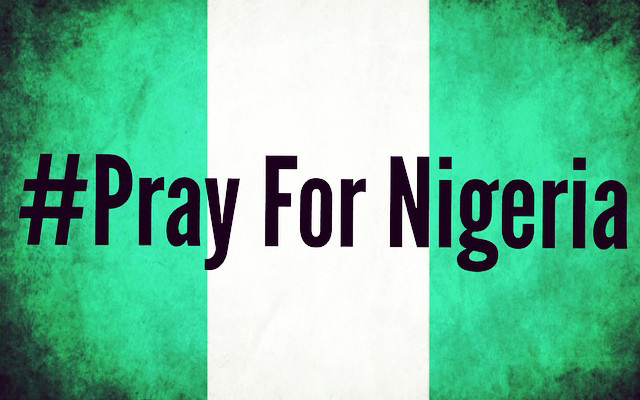Is It Finally Time To Stop Praying For Nigeria?
The wise man was right when he said that hope deferred makes the earth sick (Proverbs 13:12). Many people who have nurtured some measure of hope about the possibilities of a turnaround for Nigeria have become pessimistic; the reasons to doubt have overwhelmed the reasons for hope. For them, it has gotten to a point where to be pessimistic is to be realistic.
Some of them believe that given the current situation — especially the unending and grievous spate of insecurities across the country — praying for the country is now worthless. As some of my friends will say, the important thing now is to pray for yourself and your family (and start planning your “escape” once you rise up from your knees).
Because these people rightly believe that prayer alone won’t solve our problems, they then conclude that prayer is useless. As Burna Boy puts it in one of his songs, “our country problem e pass Jesus, cause na we be our own problem.”
However, while it is true that prayer alone won’t solve our problems, an understanding of God’s sovereignty over all things still requires us to keep praying for our nation and its leaders.
How so?
A call to prayer
In Psalms 122, David called on all the Israelites who were making pilgrim journeys to Jerusalem (where the temple is) to “pray for the peace of Jerusalem” (verse 6). He called them to pray that those who love Jerusalem will be secure in the land and that peace and security will be within its walls.
David states two reasons why he said such prayer: for the sake of his family and friends and for the sake of God’s temple that is in the city. And while he prays for the city’s peace, he will also seek its prosperity (verse 9).
Notice that peace was one of the fundamental concerns of the Psalmist. Seeking the prosperity of the land is all well and good but it is hard for an insecure land buried in turmoil to prosper. So, for the sake of his family, friends, and the temple, David called on every Israelite to pray for the city’s peace.
Some may say that this call for prayer was important because Israel had a special covenantal relationship with God that Nigeria does not have. While it is true that Israel, as a nation, was God’s covenant people, praying for the peace of the nation where one resides, is independent of its covenant status.
Even when God was about to send the Israelites to exile in Babylon, he told them to “seek the peace and prosperity of the city to which I have carried you into exile” (Jeremiah 29:7). Notice that God’s focus here was the same as David’s in Psalms 122: peace and prosperity.
And just like David mentioned the presence of his family, friends, and the temple as motivation, God motivated Israel by telling them that their prosperity depends on the prosperity of the nation (verse 7).
Fast forward to the new covenant and Paul told Timothy to encourage the church to pray “for kings and all those in authority that we may live peaceful and quiet lives in all godliness and holiness” (1 Timothy 2:2).
God’s new covenant people are called to pray for those in authority so that they can live in peace and quietness. Once again, peace is fundamental.
But notice another motivation in this passage: godliness and holiness. There is a connection between peace and quietness and godliness and holiness. Consequently, if we desire to live our godly and holy lives in peace and quietness, we should pray for kings and those in authority. This does not mean we can’t live in godliness and holiness where there is no peace and quietness; however, it does mean that the combination of both should be our preference — we should prefer to live our godly and holy lives in peace rather than instability, in quietness rather than disorder.
But notice how verse 2 connects to verses 3 and 4. Paul is saying that our prayers for kings and all those in authority for the sake of peace and quietness are somehow connected to God’s desire to save all people.
Even when we are not praying directly for the salvation of kings and those in authority (which we should do as well) — we are only praying for peace and quietness — the peace and quietness that result from our prayers for them have a way of accomplishing God’s saving purposes.
Therefore, those who believe that praying for peace and quietness is not necessary because the gospel spreads best amidst persecutions and turmoil are mistaken. Of course, our passion for the salvation of men should be independent of the times we live in, but times of peace and quietness are not opposed to the gospel. God might choose to give us difficult times (and the gospel does thrive in difficult times) but our responsibility is to pray for peace and quietness. Moreover, peace and quietness are not antithetical to the spread of the gospel.
The summary of this section is to briefly re-establish the fact that God has indeed called us as believers to pray for the peace and prosperity of our nations and the kings and magistrates who rule over such nations.
And this prayer is important because of our friends and family, the church of God (which is the new covenant fulfilment of the old covenant temple that David mentioned in Psalms 122), our own prosperity, godliness, and holiness.

Is prayer enough?
Does it then mean that all we need to do is pray?
The short answer? No!
There are certain things that are correlated to the peace and prosperity of any nation and when a nation is on the negative side of those things, it is difficult to find peace and prosperity.
Though no nation on earth has a direct covenantal relationship with God like Israel (where there were specific blessings for obedience and specific curses for disobedience), every nation still exists in God’s moral universe.
In this moral universe, God has designed that certain things will bring blessings and certain things will bring curses, on individuals as well as nations. And sometimes, God intervenes more directly to bring about those blessings and curses.
For example, though Babylon had no covenantal relationship with God, he judged king Nebuchadnezzar for his haughtiness and impiety (Daniel 4). And he destroyed the inhabitants of Canaan for their disgusting actions, which included the sacrifice of their children to their gods (Deuteronomy 9:1-6).
In Isaiah 13-23, we see God arraigning different nations to his court and pronouncing judgments on them for their sins.
But even when God does not directly intervene in such manners, he rules over a moral universe he designed to punish evil and reward righteousness. (And he will one day finally destroy all evil nations, world systems, and evil rulers that oppose his kingdom and persecute his people — Revelation 14-20).
So, for example, Solomon tells us that “righteousness exalts a nation but sin condemns any people” (Proverbs 14:34). In a later chapter, he also taught that “a throne is established through righteousness.” Therefore, we can expect that when a nation embraces righteousness, it will be exalted and when a leader embraces it, his throne will endure, vice versa.
We also see in Proverbs other qualities that are important for kings and rulers to sustain their thrones and maintain the peace and prosperity of their nations. A king must be wise and punish wickedness (Proverbs 20:26); he must possess love and faithfulness (20:28); he must be inquisitive and thirsty for knowledge (25:2); he must pursue justice and refuse bribes (29:4, 14); he must have his mind in order so that he can maintain justice (31:4).
All these conditions are necessary for every magistrate irrespective of the political system (monarchy, aristocracy, democracy, or constitutional republicanism).
These virtues must not only be found in the magistrates, they must pervade the nooks and crannies of the nation. Righteousness, in rulers and the ruled, exalts a nation, so does justice, wisdom, and a thirst for knowledge.
Therefore, it is expected that when sin replaces righteousness, crass injustice replaces justice, indolence replaces a thirst for knowledge, and foolishness replaces wisdom, a nation will suffer for it — no peace, no prosperity.
(Note: In God’s sovereignty, he sometimes allows some evil regimes to prosper. He allowed Babylon to prosper and even punish Israel for his own purpose (Isaiah 10, Habakkuk 1). Also, nations can become prosperous due to righteousness, justice, wisdom, etc., and then fall away from those virtues without losing the prosperity at one fell sweep.)
So, when people say prayer is not enough in an attempt to point out the facts above, they are right. If we continue to pray while wickedness, injustice, indolence, and foolishness engulf the land, we are merely displaying the dead faith of James 2.
Consequently, while we pray for peace and prosperity, we must become the kind of nation where peace and prosperity can dwell.
Does this then mean that prayer has no place and all we have to do is keep reminding each other of the moral conditions for peace and prosperity?
The short answer? No!

Is prayer irrelevant?
The above rather than make prayer unnecessary should change the way we pray. We should not only pray for ends; we should also pray for means.
What do I mean?
Yes, the peace and prosperity of a nation depends on the righteousness, justice, wisdom, and thirst for knowledge of the ruler, among others, but who says that God doesn’t give all those?
Have we forgotten that the heart of the king is a stream of water in the Lord’s hand that he can channel towards his ends (Proverbs 21:1)?
If a king is proud, the Lord can humble him like he did Nebuchadnezzar (Daniel 4). If a king is disobedient and unfaithful like Saul, God can replace him with David. God even raises up kings that will serve his specific purposes at particular times (an example is Cyrus in Isaiah 45:1).
So, instead of refusing to pray, we must broaden our prayers to include both the ends (peace and prosperity) and the means (righteousness, justice, wisdom, et al).
Yes, we need righteousness to exalt our nations, but who can make our hearts righteous if not God? Who gives wisdom if not God who “gives generously to all without finding fault?” (James 1:5). Who can cause justice to flow down like waters except the God who himself is just? How can we embrace knowledge except through the fear of God (Proverbs 1:7) and who can fear God except he himself inspires us to fear him (Jeremiah 32:40)?
Responsibilities as citizens
Of course, given the following, we must do more than pray. We ourselves must pursue righteousness, justice, wisdom, knowledge, etc.
Also, given that we live in democracies and republics, God will use us as means to bring about answers to our prayers.
Even in biblical times where democracies did not exist, the importance of citizens is evident. The people of Israel united to ask for a king (1 Samuel 8), Absalom sought the empathy of the people in his bid to unseat David (2 Samuel 15). In both cases, they sinned against God, but the point is to emphasise that citizens are important in any political organisation.
Therefore, in addition to praying, we must participate in the political process.
Yes, we can pray for God to give us good leaders, but we must also offer ourselves as means by being politically intelligent so we can vote for good leaders. God does remove evil kings but he does it through the votes of citizens who must be politically discerning to distinguish between good and evil rulers.
When an illegal, wicked, and tyrannical Queen — Athaliah — came on the throne, Jehoiada, the high priest, took some soldiers to arrest and dethrone her (2 Kings 11). That’s political responsibility!
So, while we pray, we must not be passive; we must embrace the nation where God in his sovereignty has placed us and be politically responsible.
However, we must never believe that such political responsibility makes prayer unnecessary. We must pray and work and work and pray. Our understanding of God’s sovereignty should direct us to call on God to give us peace and prosperity while we offer ourselves as part of the means God will use.
Conclusion
The most important thing about a believer is that we belong to God’s church — invisible and visible.
But believers, as individuals and as a group, live in secular nations.
God wants us to pray for the peace and prosperity of those nations for our sake, for the sake of our family and friends, the visible church, and our holiness and godliness.
While the kingdom of God does not depend ultimately on peaceful conditions, believers must seek peace and quietness and rejoice when God grants it.
Moreover, we should make our prayers more expansive — praying for the ends and the means — while we offer ourselves to God as politically responsible citizens who God can use as part of the means to achieve his purposes.
When God does grant us peace and prosperity, let’s be careful that we don’t become so comfortable that we forget the kingdom or begin to take glory for what God alone has done (Deuteronomy 8).
May God send peace and prosperity to Nigeria.
Great King of nations, hear our prayer,
while at your feet we fall,
and humbly, with united cry,
to you for mercy call.
The guilt is ours, but grace is yours,
O turn us not away;
but hear us from your lofty throne,
and help us when we pray.
Our fathers’ sins were manifold,
and ours no less we own,
yet wondrously from age to age
your goodness has been shown.
When dangers, like a stormy sea,
beset our country round,
to you we looked, to you we cried,
and help in you was found.
With one consent we meekly bow
beneath your chast’ning hand,
and, pouring forth confession meet,
mourn with our mourning land.
With pitying eye behold our need,
as thus we lift our pray’r;
correct us with your judgments, Lord,
then let your mercy spare.



